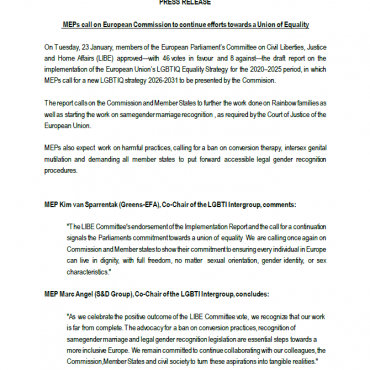EU foreign affairs ministers adopt ground-breaking global LGBTI policy
Today the EU’s 27 foreign affairs ministers adopted a ground-breaking global policy. The LGBTI Guidelines instruct EU diplomats around the globe to defend the human rights of LGBTI people.
The Council of the European Union*, the body that represents the 27 national governments in the EU, had already adopted a non-binding toolkit to promote LGBT people’s human rights in June 2010.
Three years later, foreign affairs ministers have now upgraded the document to these new Guidelines to promote and protect the enjoyment of all human rights by lesbian, gay, bisexual, transgender and intersex (LGBTI) persons.
The Guidelines will be binding. The EU’s diplomatic efforts will revolve around four priorities:
- Eliminate discriminatory laws and policies, including the death penalty
- Promote equality and non-discrimination at work, in healthcare and in education
- Combat state or individual violence against LGBTI persons
- Support and protect human rights defenders
Ulrike Lunacek MEP, Co-President of the LGBT Intergroup, welcomed the new document: “It is absolutely ground-breaking that the 27 foreign affairs ministers agreed to this, and only three years after the LGBT Toolkit. And I’m very happy the document pays particular attention to trans and intersex people, as well as lesbian and bisexual women at risk of gender-based violence.”
Michael Cashman MEP, also Intergroup Co-President, added: “We’re extremely happy with the Guidelines, and I can hardly add anything to this excellent document. The Council did an outstanding job, about which I have no reservations.”
“In partnership with EU delegations around the world, the European Parliament will monitor their implementation starting this autumn.”
Read more:
*: The Council of the European Union is different from the Council of Europe. The former represents EU Member States’ governments (currently 27); the latter is composed of 47 European countries (including Iceland, Norway, Turkey, Russia, Azerbaijan…).
(Image: © Council of the European Union)







